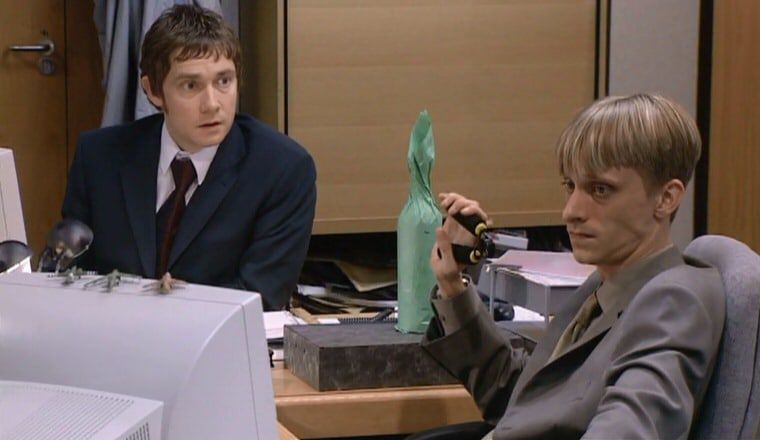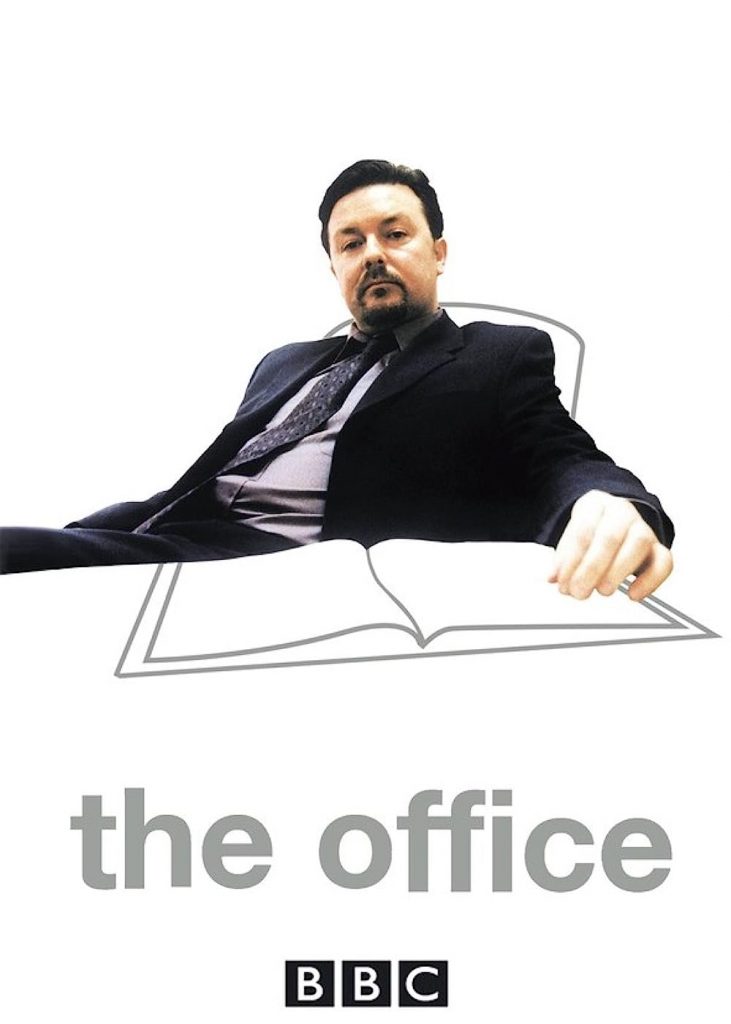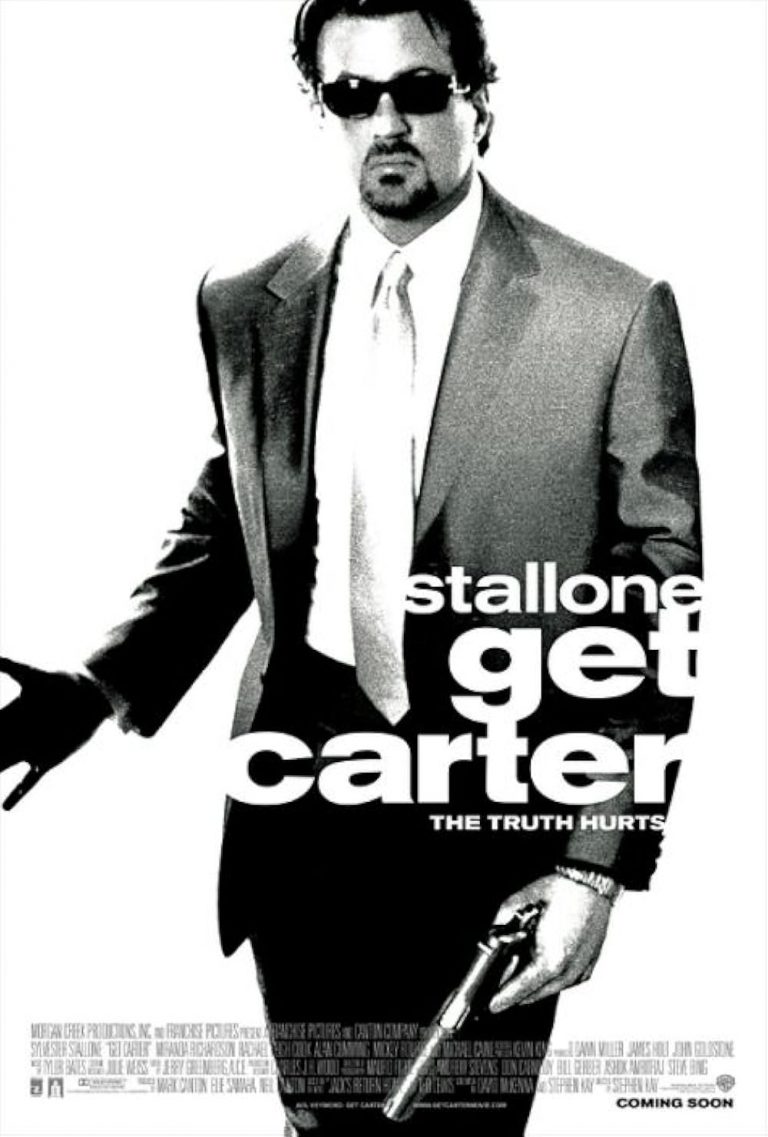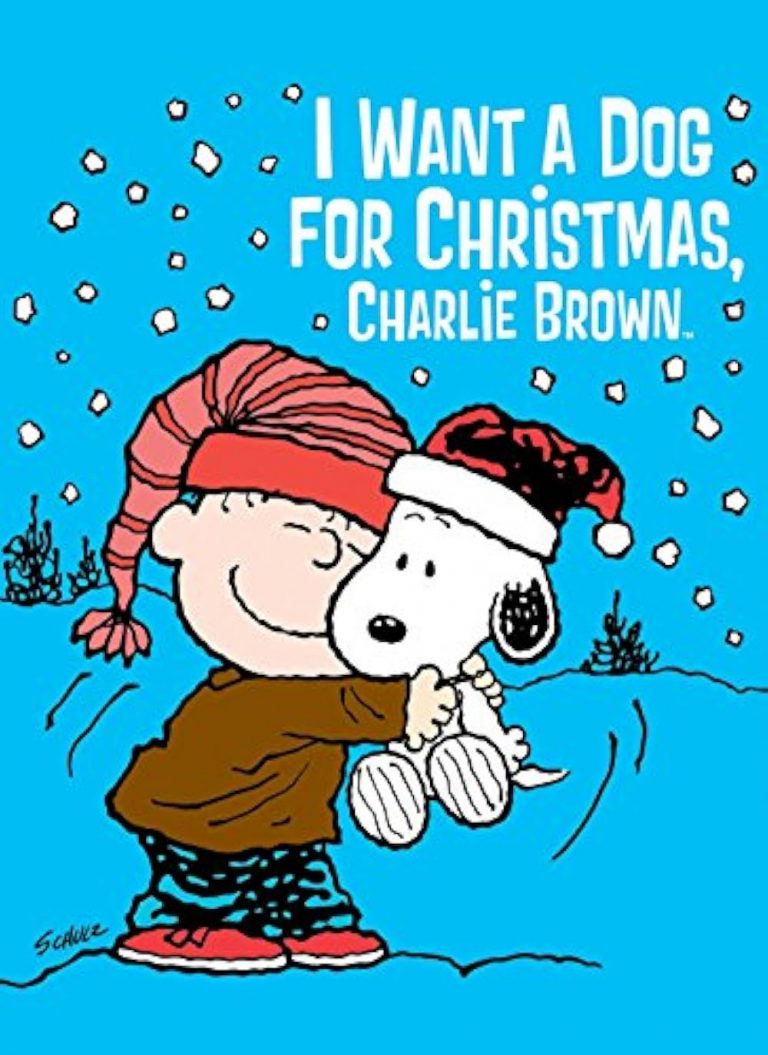Starring: Ricky Gervais, Martin Freeman, Mackenzie Crook, Lucy Davis, Stirling Gallacher, Oliver Chris, Ralph Inesop, Patrick Baladi, Stacey Roca, and Elizabeth Berrington
Grade: C
Before watching the popular U.S. version of The Office, I wanted to see where it all started. The original U.K. show is considered by many to be among the best British sitcoms ever made. It’s influence in comedy, television, and cringe humor is as clear as day. There’s a lot of genius in the writing, and I can see how its style inspired so many different productions and copycats. With that being said, the American version is much better. It could be the American in me, but I found it more interesting, moving, better written in terms of character development, and a hell of a lot funnier. Many people wonder why the first season of the American version of The Office is so slow-moving and different from the rest of the series. Well, it’s because they were trying to emulate the dreary and mundane atmosphere the original did so well. Isn’t it weird how much better the U.S. version was by Season Two? It shouldn’t be. As soon as they got away from the style of this show, things started clicking for a reason.
In the Slough branch of paper company Wernham Hogg, a documentary crew for the BBC films the day-to-day work life of its employees. Heading up everything is the bumbling manager of the office in David Brent (Gervais). Though he would never say it outright, David loves and craves being the center of attention. He loves the camera being in his face. He knows he’s being positioned as the main character of this documentary and looks at this show as an opportunity to prove he’s the beloved “captain” of the workplace rather than the consistently disrespected goofball he actually is. David acts for the camera constantly and will regularly try to pander for potential viewers. Continuously, he’ll talk about how much he hates racism, loves kids, and every other cliché, politically correct response he can think of because of how badly he wants to look like a good-natured celebrity personality. However, he tends to undermine himself because of his inappropriate and awkward sense of humor, extreme lack of self-awareness, total delusion, selfishness, inability to adapt or evolve, and his personal insecurities that undercut his potential at every turn. It’s self-sabotage really because this is just who David Brent is. He wants to be successful at the highest of levels but wants to do it on his terms, despite the fact his terms aren’t working. Additionally, he wants to be the cool boss, the one everyone looks to for advice or looks up to as a “mentor”.
Unfortunately, he’s very sensitive and doesn’t react well to the reality of what goes on in his workplace and how his employees act towards him. His refusal to see to what’s actually going on borders on insanity. You actually sit there and wonder throughout these two short seasons, “Can someone actually be this delusional?”.
At first, I thought the humor was centered around David’s inability to read a room, but at times, it seems as if he knows how badly things are going but he lies to himself publicly, just so he doesn’t flip out. David is playing a character for the BBC because it’s the person he wants to be in front of the camera. Privately, you can tell David is a sad, out of shape, middle-aged man that can’t come to terms with who he is as a person. I know the comedy stems from the awkward character David becomes in front of the camera, but the reality of it is rather sad to watch. He wishes badly to be the “funny guy” in the office and tries outrageously hard to gain this reputation from his staff. Sadly, no one finds him funny at all. They don’t even give him a pity laugh. Most of the time, they stare awkwardly into the abyss as he tries to get a reaction out of them, and they react even worse when he says something offensive in the name of humor. This never brings David down however, as he still tries endlessly to get a laugh. He passes this off as the ever important “boosting of morale” among his workers, but it never brings the mood up or down for them. They work regardless of David trying to lighten the mood. His superiors in Jennifer (Gallacher) and later Neil (Baladi) don’t appreciate his methods of managing, but it’s not because they are against boosting morale. They just can’t help but notice that David is never on task because of this “goal” (if you can call it that). Right from the beginning, David continuously shows Jennifer he’s not fit to manage and can’t seem to make any adjustments whatsoever to prove he deserves his job.
In Season One, a promise of downsizing is coming, and David and Neil are basically competing to see who will acquire the other in a merger. In “Work Experience“, after hearing Neil had to let some people go, David lies and says he fired a warehouse worker. When Jennifer finds out he made it up, she demands he actually fire someone to cut costs. He acts like he fired Chris Finch (Ineson) over the phone, but he didn’t. In fact, a few episodes later (New Girl), he doubles down and hires a second receptionist. His priorities are all out of whack. By the end of Season Two, he becomes so disruptive, it starts to get annoying. By the time he gets fired in “Charity“, you see why. I like David, and I don’t like Neil’s smug self. However, from a business standpoint, you can’t help but agree with Neil. David is insubordinate, undermines the boss at every turn, and doesn’t take his job nearly as serious as he should. He forced Neil’s hand. Even though they’re both cunts, Neil cut David a lot of slack. David repaid him by getting worse at his job. In “Interview“, you do feel bad because David breaks character in a way, begging for the redundancy decision to be reversed, but again, he was on thin ice for a while. They gave him shot after shot. The dude is just a jackass.
Ricky Gervais does a wonderful job as David though. I’m a huge fan of Gervais and his humor. He makes the idiotic antics of David worthwhile. At the same time, he also puts together a very complete performance in moments where he shows his true colors, especially when he’s about to flip out. It’s funny every time.
Salesman Tim Canterbury (Freeman) is the likable, actual funny man in the office. He’s thirty, still lives with his parents, and hates his job. It doesn’t help matters much that he has to work with the office weirdo Gareth Keenan (Crook). At first, he deals with the annoying stuff that Gareth does, but things start clicking when he starts to mess with Gareth more and more with pranks and jokes. It makes the day go by quicker. What helps is receptionist Dawn Tinsley (Davis). She loves Tim’s sense of humor and regularly looks to him for entertainment in the boring office, and he enjoys it. This is mostly because he’s hopelessly in love with her. Sadly, Dawn is engaged to the crass, tough, warehouse worker Lee (Joel Beckett). It’s not the happiest of relationships, as he regularly embarrasses her and undermines her goals of becoming an illustrator, but she sticks with him for whatever reason. He’s got a violent temper too and is very controlling. Tim sees it daily and though the chemistry between him and Dawn is as clear as day, he can’t seem to win her over. One of the saddest moments of the show is when he’s turned down a second time in the “Interview“.
In terms of acting and looking back at some of the best moments of the show, this is one of them. When he turns off the mic, you know it’s real. His heartbroken response to the camera after it all happens is devasting.
I understand how an office romance can happen so easily because of the time spent together, but I couldn’t help but wonder what Tim sees in Dawn. In The Office, there’s not a lot of character development to show us what makes Dawn this woman that Tim is infatuated with. She’s quiet, she laughs at his jokes, is incredibly uncomfortable with almost everything Lee does, and that’s pretty much it. We don’t know much else about her, so I don’t see the attraction. I do see why she would like Tim because she actually smiles when she’s around him, and she’s obviously jealous when he starts dating Rachel (Roca). It doesn’t make much sense as to why it takes so long for her to realize why Lee’s a fucking douchebag. At least in the American version of The Office, we see how Pam likes Roy at times and why things can’t happen right away. However, in this version, Dawn looks miserable at every turn until she hangs around Tim. I suppose it makes the “Christmas Special” episodes sweeter, but it makes the entirety of the two seasons drag to no end, making it unbearably uncomfortable more often than it should be. Yes, I understand the show hangs its hat on this concept, but you can’t make everyone lose until the final episode and expect me to enjoy myself. It just makes things tiresome and gives me less of a reason to ever watch this show again. Martin Freeman is very good though. He’s a major highlight in The Office, and you feel for him every step of the way. He’s a natural as the most likable character in the cast. You can see how John Krasinski tried to emulate this same energy and charisma that made him Freeman a star in the American version of The Office.
…and may I say, Krasinski succeeded in doing so.
Gareth is the enigma of the office. A weird person and an even weirder one to look at, Gareth is a fellow salesman who takes his meaningless position as “Team Leader” of the office way too seriously, trying to use his fake title as a way to institute authority over others. He’s awkward, can’t talk to women at all, and talks about his work in the Territorial Army like he served in Vietnam. Essentially, he’s a guy who deserves to be messed with and that’s why Tim and Dawn go out of their way to do so. He causes shit as soon as he walks into the office, so if no one were to retaliate or say something, he would piss off everyone more than he already does. He doesn’t have many redeeming qualities and his shtick gets tired by the end of the show. Though he’s an interesting personality to have around, his character isn’t really that important to the overall story arc. Honestly, I’m not even sure if Mackenzie Crook was that good in his role, or he was just memorable because he looks so strange. I’m starting to think it was the latter.

After this, the show is sprinkled with a bunch of smaller supporting characters like David’s very serious superior in Jennifer that is eventually made partner, the aforementioned smug dickhead Neil, the flirty co-worker that everyone wants to fuck in Rachel, large moron Keith (Ewen MacIntosh), the temp worker who was so insignificant that the show wouldn’t have changed even if wasn’t there in Ricky (Chris), and the insufferably obnoxious, asshole salesman Chris Finch.
“The Quiz” was such an awful episode because of Finch, I wanted to stop watching altogether.
The much-celebrated show only has so many episodes, so the list of favorites are few and far between. If I were to pick some that pop out as favorites, it’s easily the disastrous staff training day (Training), David at his most incompetent (Work Experience), the devasting finale of Season Two (Interview), and the series finale that made things worth it (Christmas Special: Part 2).
Ricky Gervais and Stephen Merchant’s The Office is funny. It’s not life-changing funny or anything, but the circumstances can be funny and the cringe-worthy humor (if you’re up for it) is decently entertaining. Obviously, all of the best lines come from David Brent’s antics and him trying to cover for himself after realizing he messed up or went too far. However, just like the dreary mood-lighting of the office look, the show drags. It feels like a workday. I suppose that was the point because the realism is eerily good, but I can’t imagine why someone who actually works in an office setting would rush to a television screen to watch their day play over again for the agonizing half-hour the show can be. It’s slow, it’s depressing, and though we know how comedy can come out of awkward situations naturally (and The Office is famous for zeroing in on this), the show overdoes the fuck out of it. Yes, it’s funny, but it gets very repetitive, and you start to see the jokes coming by Season Two. As you start to delve deeper into the story, you get more invested in the characters rather than the comedic factor of the show but as this happens, the humor seems to get more in the way if anything. It gets tired. As I said before, when we continue to see David doing the same stuff, you start to wonder aloud, “Can someone actually be this delusional?”.
I always wondered why the original version of The Office only went on for two seasons while the American one went on for nine. Some have said that the British just know when to end a show. They told the story they wanted to tell and didn’t want to overdo it like American shows do. Though I can see this point, I think the actual reason is that the way the show is presented and how the humor is, it wouldn’t be sustainable any longer than it was. The subplots drag on for what seems like forever. Within two seasons, I already started to get frustrated, bored at times, and disheartened with all of the characters’ individual situations. This couldn’t have gone on for five seasons, let alone nine. There simply wasn’t enough content to stretch this out any longer. It wasn’t entertaining enough and started to plateau much quicker than expected. The jokes became predictable after two seasons and there wasn’t much else going on besides the main story arcs. It was like they started the show with a half tank of gas, and we ran on empty by the time the Christmas episodes came about. The U.K. Office was set up like a limited series for American television. In this case, the show works, but it doesn’t drag any less when looked at through these lenses.
This is especially true with our main character David Brent. He becomes the butt of the joke for so long because of his desperation in trying to entertain people who don’t like him, or think he’s funny/a good boss, that we just start to feel bad for the poor bastard. Steve Carell’s Michael Scott has a lot of moments where we see how he still manages to make a connection with the others, despite his outlandish humor at times. This is what makes him so endearing to us and the staff members of the office. With David, it seems like no one would give a fuck if he lived or died and his loneliness makes the series more bleak than as funny as the Brits seem to think it is. Maybe this is the fundamental difference between American and British comedies. When discussing the U.K. Office, many have told me that I “just don’t get British humor”, but I have to disagree. I’m a big fan of Ricky Gervais, I love a lot of British comedies and shows, and I understand the humor presented. It’s not rocket science. I just don’t think the show is all that great, and I definitely don’t think it’s remotely close to being as funny as people say it is.
I guess you could say, “It’s not my cup of tea”.
I’ll let myself out.
Again, there’s still some genuinely funny moments, but I never felt the need or want to re-watch this series like I did with the American version. I respect The Office‘s place in television history and all that, but I wasn’t impressed. It had its moments, but I honestly didn’t find it that funny. Sure, I’m glad I watched it to see what everyone was talking about, but I’ll probably never watch it again.
This should tell you enough on which version of The Office is superior.





+ There are no comments
Add yours